Limitless Africa
All Episodes
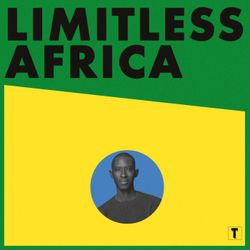
43. Why an African luxury shoe brand is headquartered in the U.S.
15:01||Season 3, Ep. 43"I became extremely fascinated with Mansa Musa's story."Why would an African-founded luxury brand choose to build its headquarters in the United States?In this episode of Limitless Africa, host Claude Grunitzky speaks with Armando Cabral, founder of Armando Cabral Footwear, who was born in Guinea-Bissau and now runs his brand from New York. Cabral explains how his African heritage shapes his design philosophy, why he describes himself as a “cultural design activist,” and how the pandemic pushed him to research West African history more deeply, including the Mali Empire and Mansa Musa.Cabral also breaks down the practical business logic behind locating in the U.S. market: access to entrepreneurial energy, stronger retail networks, and an ecosystem that responds to ambition with enthusiasm rather than skepticism. He shares what it took to land major American retail partnerships, including Bloomingdale’s, and how collaborations with brands like Allen Edmonds validated the global appetite for authentic African storytelling paired with uncompromising quality.Finally, the episode confronts a hard question: why not manufacture in Africa today? Cabral offers an unglamorous but important answer about infrastructure, expertise, and the realities of scaling craft at luxury standards, while still articulating a long-term vision of expanding retail presence across the African continent.Plus: Three tips for entrepreneurs🌟 IN THIS EPISODE:1:12 From model to cultural design activist2:36 Why Mansa Musa inspired a fashion label4:49 Expansion in Africa5:42 U.S. H.Q7:30 The African consumer9:19 Manfacturing in Africa10:52 Getting Bloomingdale's💬 QUOTES TO REMEMBER:"In order to know where you're going, you need to know where you come from.""African heritage is very unique.""It's going to be tough, but eventually you will succeed. "🌍 ABOUT LIMITLESS AFRICAThe podcast that asks how Africans and Americans can work together for shared prosperityEvery Monday: 15 minute episodes that dive into an issue that matters to AfricansEvery Thursday: extended interviews with people unlocking Africa’s limitless potential➕ WANT MORE?"If there is something that Africa can learn from America, it's that abundance mindset." - Olugbenga Ogunbowale https://trueafrica.co/article/podcast/if-there-is-something-that-africa-can-learn-from-america-its-that-abundance-mindset/"Sometimes to build Africa, you have to leave Africa" https://trueafrica.co/article/podcast/sometimes-to-build-africa-you-have-to-leave-africa/💗 LOVE LIMITLESS AFRICA?Subscribe on Spotify, Apple, or wherever you get your podcastsLeave a 5⭐ review. It helps more people find the showShare with someone interested in Africa’s creative industries🚀 FOLLOW LIMITLESS AFRICAInstagram: @_trueafricaWebsite: https://trueafrica.co/Substack: https://limitlessafrica.substack.com/🤝 FRIENDS OF LIMITLESS AFRICALimitless Africa is sponsored by the US Department of State and the Seenfire Foundation.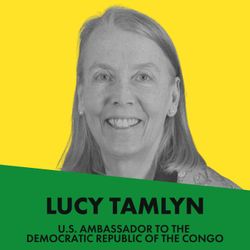
42. Ambassador Tamlyn - "It's a youth boom that the world has never seen"
22:02||Season 3, Ep. 42"One thing that I really was not as aware of as perhaps I should have been, was the deep and abiding Congolese sense of having a long term relationship with the United States."Ambassador Tamlyn has spent much of her career working across Africa, from Sudan and the Central African Republic to Mozambique, Chad, and now the Democratic Republic of the Congo. The DRC has Africa’s fourth-largest population at around 112 million. Yet it remains one of its poorest countries and that's despite being the world’s biggest producer of cobalt. Vast mineral wealth has in part fuelled a two-decade-long conflict in the east, one the United States has been trying to end. Could this be a breakthrough for a new foreign policy approach known as 'commercial diplomacy'? I spoke to one of Washington’s most experienced ambassadors. Plus: Why the US needs to care about Congo🌟 IN THIS EPISODE:2:41 The shared DNA between Congo and the USA4:08 Congo's potential7:44 The American company boosting connectivity in Congo9:10 The competing interests in South Kivu14:07 Can business bring peace?16:06 Battling corruption18:23 The Congolese consumer💬 QUOTES TO REMEMBER:"The Congolese are very proud of the Ali - Foreman fight.""They're consumers of American goods, American services, American education, American sports activities.""Our goal through encouraging better government, governance, transparent governance, accountability is to try to encourage the government to hold all investors, all economic partners, to the same standard, the standards of the laws of the country."🌍 ABOUT LIMITLESS AFRICAThe podcast that asks how Africans and Americans can work together for shared prosperityEvery Monday: 15-minute episodes that dive into an issue that matters to AfricansEvery Thursday: extended interview with someone unlocking Africa's limitless potential➕ WANT MORE?“Foreign aid has fuelled corruption, dependence, weak governance” Maya Horgan Famodu doesn't hold back https://trueafrica.co/article/podcast/foreign-aid-has-fuelled-corruption-dependence-weak-governance/The next generation of mines bringing value to Africa https://trueafrica.co/article/limitless/the-next-generation-of-mines-bringing-value-to-africa/Is venture capital the right choice for African start-ups? https://trueafrica.co/article/podcast/is-venture-capital-the-right-choice-for-african-start-ups/💗 LOVE LIMITLESS AFRICA?Subscribe on Spotify, Apple or wherever you get your podcastsLeave a 5⭐ review – it helps get the word outShare with someone passionate about industry in Africa🚀 FOLLOW LIMITLESS AFRICAInstagram: @_trueafricaWebsite: https://trueafrica.co/Substack: https://limitlessafrica.substack.com/🤝 FRIENDS OF LIMITLESS AFRICALimitless Africa is sponsored by the US Department of State and the Seenfire Foundation.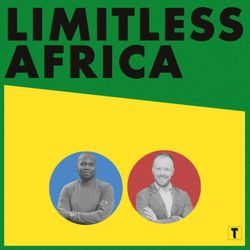
41. The railway opening up mining opportunity in Africa
15:08||Season 3, Ep. 41"If we stop mining, we stop our way of life."The Lobito Corridor is more than just a railway; it is a strategic lifeline connecting the Atlantic port of Lobito in Angola to the mineral rich Copperbelt in the DRC and Zambia. In this episode, host Claude Grunitzky sits down with explorer and presenter Dwayne Fields and Sam Williams, Head of Communications at Africell, to discuss the revival of this historic infrastructure. We explore why the U.S. government is mobilizing private capital to secure access to critical minerals like copper and rare earths, which are essential for the global economy. From Dwayne’s personal genetic journey back to his ancestral roots in the Copperbelt to Africell’s mission to digitize the corridor, this episode examines the intersection of high stakes geopolitics and the human stories of the communities on the ground. Can large scale mining truly benefit ordinary Africans? We look at the risks of exploitation and environmental damage versus the potential for jobs, connectivity, and local prosperity.Plus: why a telecommunications company is making a documentary🌟 IN THIS EPISODE:2:19 How to be an explorer3:33 Why Africa matters for rare earths3:57 The Lobito Corridor7:01 How it affects the little person11:33 How communities benefit12:33 How a telecommunications company got involved💬 QUOTES TO REMEMBER:"In truth, I benefit from mining.""We're all touched by what happens right there in Africa."🌍 ABOUT LIMITLESS AFRICAThe podcast that asks how Africans and Americans can work together for shared prosperityEvery Monday: 15 minute episodes that dive into an issue that matters to AfricansEvery Thursday: extended interviews with people unlocking Africa’s limitless potential➕ WANT MORE?The next generation of mines bringing value to Africa https://trueafrica.co/article/limitless/the-next-generation-of-mines-bringing-value-to-africa/“Africa has an opportunity to rise as an industrial superpower.” https://trueafrica.co/article/podcast/africa-has-an-opportunity-over-the-next-generation-to-rise-as-an-industrial-superpower/💗 LOVE LIMITLESS AFRICA?Subscribe on Spotify, Apple, or wherever you get your podcastsLeave a 5⭐ review. It helps more people find the showShare with someone interested in Africa’s industrial future🚀 FOLLOW LIMITLESS AFRICAInstagram: @_trueafricaWebsite: https://trueafrica.co/Substack: https://limitlessafrica.substack.com/🤝 FRIENDS OF LIMITLESS AFRICALimitless Africa is sponsored by the US Department of State and the Seenfire Foundation.
40. Claude Grunitzky - "The most successful people have had their own failures"
34:49||Season 3, Ep. 40"Ambition is often loud and fast"Limitless Africa host Claude Grunitzky is in the hot seat this episode. Claude has founded, built and sold businesses you will have heard of - he founded Trace, a global hip hop magazine. Trace eventually became the TV channel and he then raised $15million in funding from the investment bank Goldman Sachs in 2003. Now he spends his time as an investor and teaching entrepreneurship in his home country of Togo and across the continent. In this episode Claude will be talking about what Africans can learn from the American mindset - and what he learnt from the American mindset, he built Trace in the US after all.Plus: What permissionless ambition means🌟 IN THIS EPISODE:1:38 Trace's origin story8:08 From Alicia Keys to Rihanna12:11 Three principles for success17:04 The story of Dick Parsons19:46 The African entrepreneur24:37 Permissionless ambition26:07 Why Africans need to ask for permission less💬 QUOTES TO REMEMBER:“Failure wasn’t the opposite of success. It was the tuition that I paid.”"It's hard like solving a puzzle and it's hard like lifting weights.""We Africans have very strong values and we have really strong identities, but we do not support each other as much as we should."🌍 ABOUT LIMITLESS AFRICAThe podcast that asks how Africans and Americans can work together for shared prosperityEvery Monday: 15-minute episodes that dive into an issue that matters to AfricansEvery Thursday: extended interview with someone unlocking Africa's limitless potential➕ WANT MORE?What can African entrepreneurs learn from the American mindset? https://trueafrica.co/article/limitless/what-can-africans-learn-from-the-american-mindset/How the American mindset built Africa's most funded crypto platform https://trueafrica.co/article/podcast/i-got-exactly-what-i-wanted-which-was-my-dms-full-of-nigerian-men/"Vision without execution is hallucination" - Adam Grant on the skills that African entrepreneurs need to succeed https://trueafrica.co/article/podcast/adam-grant-on-the-skills-that-african-entrepreneurs-need-to-succeed/💗 LOVE LIMITLESS AFRICA?Subscribe on Spotify, Apple or wherever you get your podcastsLeave a 5⭐ review – it helps get the word outShare with someone passionate about entrepreneurship in Africa🚀 FOLLOW LIMITLESS AFRICAInstagram: @_trueafricaWebsite: https://trueafrica.co/Substack: https://limitlessafrica.substack.com/🤝 FRIENDS OF LIMITLESS AFRICALimitless Africa is sponsored by the US Department of State and the Seenfire Foundation.
39. What can African entrepreneurs learn from the American mindset?
15:03||Season 3, Ep. 39"Every Clark Kent can become Superman, every Diana Price can become Wonder Woman."The American mindset has produced some of the greatest entrepreneurs the world has ever seen… from Henry Ford to Oprah Winfrey. What can Africans learn from their success? Our host Claude Grunitzky talks to entrepreneurs from all over the continent.Plus: Why Ubuntu is global🌟 IN THIS EPISODE:3:24 Silicon Valley, Mecca for entrepreneurs4:51 The can-do attitude7:36 The trait Americans and Africans share9:30 Vintani Nafassi presents Tumpete 10:13 Why Francophone Africa is welcoming the USA11:59 Ubuntu is global💬 QUOTES TO REMEMBER:"The U.S. has also attracted some of the best talent globally.""Silicon Valley has the most concentration of people that want to make a difference in the world and have a global impact.""You want to see resilience, go to Nigeria."🌍 ABOUT LIMITLESS AFRICAThe podcast that asks how Africans and Americans can work together for shared prosperityEvery Monday: 15 minute episodes that dive into an issue that matters to AfricansEvery Thursday: extended interviews with people unlocking Africa’s limitless potential➕ WANT MORE?Adam Grant on the skills African entrepreneurs need to succeed https://trueafrica.co/article/podcast/adam-grant-on-the-skills-that-african-entrepreneurs-need-to-succeed/How to make money from your creativity in Africa https://trueafrica.co/article/podcast/how-can-african-creatives-make-money-from-their-art/How I made it: the entrepreneur bringing refrigeration to Africa https://trueafrica.co/article/podcast/how-i-made-it-the-entrepreneur-bringing-refrigeration-to-africa/💗 LOVE LIMITLESS AFRICA?Subscribe on Spotify, Apple, or wherever you get your podcastsLeave a 5⭐ review. It helps more people find the showShare with someone interested in entrepreneurship in Africa🚀 FOLLOW LIMITLESS AFRICAInstagram: @_trueafricaWebsite: https://trueafrica.co/Substack: https://limitlessafrica.substack.com/🤝 FRIENDS OF LIMITLESS AFRICAVintani Nafassi presents Tumpete https://vintaninafassi.com/Limitless Africa is sponsored by the US Department of State and the Seenfire Foundation.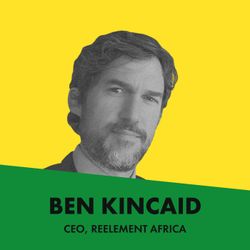
38. Ben Kincaid - “Africa has an opportunity to rise as an industrial superpower.”
32:35||Season 3, Ep. 38“Africa has an opportunity over the next half a generation to really rise as an industrial superpower.”Ben Kincaid spent the first half of his career as a US diplomat. Much of his time was spent in Africa, specializing in national security issues. Today, and that's why we're so keen to speak with him, he's the CEO of ReElement Technologies Africa, One of their missions is to help African nations process their rare minerals on the continent so they don't simply export them. Their project should create more jobs and keep value in Africa. They've just secured a South African investment firm as an anchor investor in their private capital raise worth $150 million dollars. Plus: How the low-chemical, energy-efficient refining technology works🌟 IN THIS EPISODE:1:45 Why rare earth minerals matters4:36 How the tech works12:29 The status-quo15:26 Owning the value chain20:29 From diplomat to entrepreneur26:17 Why the DRC symbolizes hope💬 QUOTES TO REMEMBER:"The objective is audacious. The objective is historic" "Africa is a great friend to the United States but it's also a neutral party based off of where it sits""Once you're able to process these minerals into manufacturing grade material, you're going to invite more manufacturers to come to Africa"🌍 ABOUT LIMITLESS AFRICAThe podcast that asks how Africans and Americans can work together for shared prosperityEvery Monday: 15-minute episodes that dive into an issue that matters to AfricansEvery Thursday: extended interview with someone unlocking Africa's limitless potential➕ WANT MORE?“Foreign aid has fuelled corruption, dependence, weak governance” Maya Horgan Famodu doesn't hold back https://trueafrica.co/article/podcast/foreign-aid-has-fuelled-corruption-dependence-weak-governance/The next generation of mines bringing value to Africa https://trueafrica.co/article/limitless/the-next-generation-of-mines-bringing-value-to-africa/Is venture capital the right choice for African start-ups? https://trueafrica.co/article/podcast/is-venture-capital-the-right-choice-for-african-start-ups/💗 LOVE LIMITLESS AFRICA?Subscribe on Spotify, Apple or wherever you get your podcastsLeave a 5⭐ review – it helps get the word outShare with someone passionate about industry in Africa🚀 FOLLOW LIMITLESS AFRICAInstagram: @_trueafricaWebsite: https://trueafrica.co/Substack: https://limitlessafrica.substack.com/🤝 FRIENDS OF LIMITLESS AFRICALimitless Africa is sponsored by the US Department of State and the Seenfire Foundation.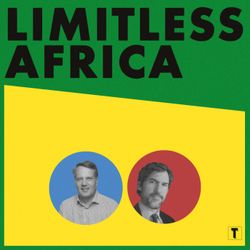
37. The next generation of mines bringing value to Africa
14:52||Season 3, Ep. 37“Processing on the continent: you can do that in Africa.”Africa holds some of the world’s most important mineral resources, from cobalt and lithium to platinum and rare earths. Yet for decades, these materials have largely been extracted on the continent, processed elsewhere, and sold back to the global market at far greater value. In this episode of Limitless Africa, hosts Dimpho Lekgeu and Claude Grunitzky examine whether a new model of mining could change that equation. They speak with Ben Kincaid, former US diplomat and CEO of ReElement Africa, and Derrick Roper, co founder of Novare Holdings, one of the company’s main financial backers.Plus: Why African investors are backing American technology🌟 IN THIS EPISODE:1:40 Who benefits from Africa’s mineral wealth?3:20 Rethinking mining, refining, and environmental responsibility6:56 Why African capital is backing American technology8:22 Mzwaa and his tune Caught Up10:32 Can processing minerals at home change Africa’s future?13:04 Can mining contribute to peace and stability?💬 QUOTES TO REMEMBER:“No security, no investment, no economic development.”“What if the value stayed on the continent?”“The real opportunity is building the entire value chain at home.”🌍 ABOUT LIMITLESS AFRICAThe podcast that asks how Africans and Americans can work together for shared prosperityEvery Monday: 15 minute episodes that dive into an issue that matters to AfricansEvery Thursday: extended interviews with people unlocking Africa’s limitless potential➕ WANT MORE?How Africa is basketball’s next big business movehttps://trueafrica.co/article/podcast/why-nba-africa-means-business/How crypto is making sending money cheaper in Africahttps://trueafrica.co/article/podcast/how-crypto-is-making-sending-money-cheaper-in-africa/Why video gaming is booming across the continenthttps://trueafrica.co/article/podcast/olivier-madiba-video-gaming-africa/💗 LOVE LIMITLESS AFRICA?Subscribe on Spotify, Apple, or wherever you get your podcastsLeave a 5⭐ review. It helps more people find the showShare with someone interested in Africa’s economic future🚀 FOLLOW LIMITLESS AFRICAInstagram: @_trueafricaWebsite: https://trueafrica.co/Substack: https://limitlessafrica.substack.com/🤝 FRIENDS OF LIMITLESS AFRICAMzwaa is an award-winning Soul, R&B, and Hip-Hop artist from Manzini, Eswatini. Listen to his new single Caught Up on Limitless Africa and here: https://www.youtube.com/watch?v=ssJl2TjLEewLimitless Africa is sponsored by the US Department of State and the Seenfire Foundation.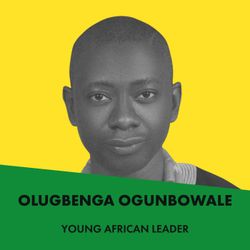
36. Olugbenga Ogunbowale - "If there is something that Africa can learn from America, it's that abundance mindset."
32:56||Season 3, Ep. 36"Whenever you have leaders who have vision and can back the vision with execution, amazing things will happen."The Mandela Washington Fellowship for Young African Leaders is the flagship program of the U.S. Government’s Young African Leaders Initiative, also known as YALI . Since 2014, the Mandela Washington Fellowship has brought nearly 6,500 young leaders from every country in Sub-Saharan Africa to the United States for academic and leadership training. These Fellows, are between the ages of 25 and 35, and are accomplished innovators and leaders in their communities and countries.One of them is Olugbenga Ogunbowale. He completed the YALI West Africa program in 2018, was a 2019 Mandela Washington Fellow and an Alumni Ambassador in 2020. Since then, he's set up ventures like Grant Master, helping secure over $30 million in grant funding for clients and students. He also set up Epower, where he consulted with Meta and Google on digital skills, training SMEs and start-ups in Nigeria and Ghana. Dimpho Lekgeu spoke to him about his experience with the YALI program to draw out some valuable lessons for young Africans looking to supercharge their careers.Plus: The hardest thing about living in the USA🌟 IN THIS EPISODE:2:39 Rejected four times6:09 YALI success8:09 The self-discovery test10:55 The power of feedback13:45 No country is perfect16:56 Advice for funding applications26:29 Start with what you have💬 QUOTES TO REMEMBER:"Whenever you have leaders who have vision and can back the vision with execution, amazing things will happen.""Feedback is the food of champions.""It's when you have the receipts, that you can be given a seat."🌍 ABOUT LIMITLESS AFRICAThe podcast that asks how Africans and Americans can work together for shared prosperityEvery Monday: 15-minute episodes that dive into an issue that matters to AfricansEvery Thursday: extended interview with someone unlocking Africa's limitless potential➕ WANT MORE?Adam Grant on the skills African entrepreneurs need to succeed https://trueafrica.co/article/podcast/adam-grant-on-the-skills-that-african-entrepreneurs-need-to-succeed/Is venture capital the right choice for African start-ups? https://trueafrica.co/article/podcast/is-venture-capital-the-right-choice-for-african-start-ups/💗 LOVE LIMITLESS AFRICA?Subscribe on Spotify, Apple or wherever you get your podcastsLeave a 5⭐ review – it helps get the word outShare with someone passionate about leadership in Africa🚀 FOLLOW LIMITLESS AFRICAInstagram: @_trueafricaWebsite: https://trueafrica.co/Substack: https://limitlessafrica.substack.com/🤝 FRIENDS OF LIMITLESS AFRICAFind out more about Olugbenga Ogunbowale https://gbengaogun.com/Limitless Africa is sponsored by the US Department of State and the Seenfire Foundation.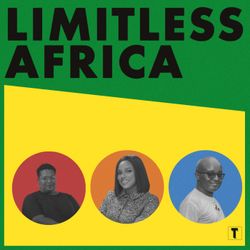
35. How a US exchange program fostered a generation of entrepreneurs
15:07||Season 3, Ep. 35"Should I happen have a one-on-one business talk with President Donald Trump, definitely would tell him that, look, sir, you have the market, I have the the produce."In this episode of Limitless Africa, we explore the transformative power of the Young African Leaders Initiative (YALI). Host Dimpho Lekgeu and Claude Grunitzky speak with alumni from across the continent who are taking their businesses global. From Simone Spencer in Cabo Verde, who transitioned from a San Francisco museum residency to building a pan-African creative network, to Gerald Katabazi in Uganda, who is now employing Americans to sell Ugandan coffee in Ohio and Atlanta. We also hear from Nigeria’s Temi Badru on how ethical leadership and the power of mentorship became the bedrock of her PR empire. This is a story of shared prosperity and a new generation of leaders who see the world as their market.Plus: How "Ubuntu" mirrors Western organization🌟 IN THIS EPISODE:1:40 What is YALI?3:33 The American mindset meets African sensibilities6:27 Coffee in Kampala9:31 President Trump, listen up!13:30 Why mentoring matters💬 QUOTES TO REMEMBER:"Community engagement is only possible with the help of many hands and will only succeed if those hands are organized.""American young entrepreneurs are also so aggressive. They are very brilliant and they like hands-on activities.""One of the beautiful things about Africans is that we believe in community."🌍 ABOUT LIMITLESS AFRICAThe podcast that asks how Africans and Americans can work together for shared prosperityEvery Monday: 15-minute episodes that dive into an issue that matters to AfricansEvery Thursday: extended interview with someone unlocking Africa's limitless potential➕ WANT MORE?World-renowned psychologist Adam Grant explains how to hone your entrepreneurial skills https://trueafrica.co/article/podcast/adam-grant-how-to-rethink-africas-hidden-potential/How to make money from your creativity https://trueafrica.co/article/podcast/how-can-african-creatives-make-money-from-their-art/💗 LOVE LIMITLESS AFRICA?Subscribe on Spotify, Apple or wherever you get your podcastsLeave a 5⭐ review – it helps get the word outShare with someone passionate about entrepreneurship in Africa🚀 FOLLOW LIMITLESS AFRICAInstagram: @_trueafricaWebsite: https://trueafrica.co/Substack: https://limitlessafrica.substack.com/🤝 FRIENDS OF LIMITLESS AFRICAWe're delighted to feature Vanessa Delgado, an amazing musician from Cape Verde - follow her here https://www.instagram.com/vanessadelgadodaluz and here https://www.facebook.com/vanessa.delgado.3388630/Simone Spencer runs Creative Base https://www.instagram.com/creativebase.cv/?hl=enGerald Katabazi runs Volcano Coffee https://www.instagram.com/volcanocoffee/Temi Badru runs Voices and Faces Communications https://ng.linkedin.com/in/temi-badruLimitless Africa is sponsored by the US Department of State and the Seenfire Foundation.
loading...